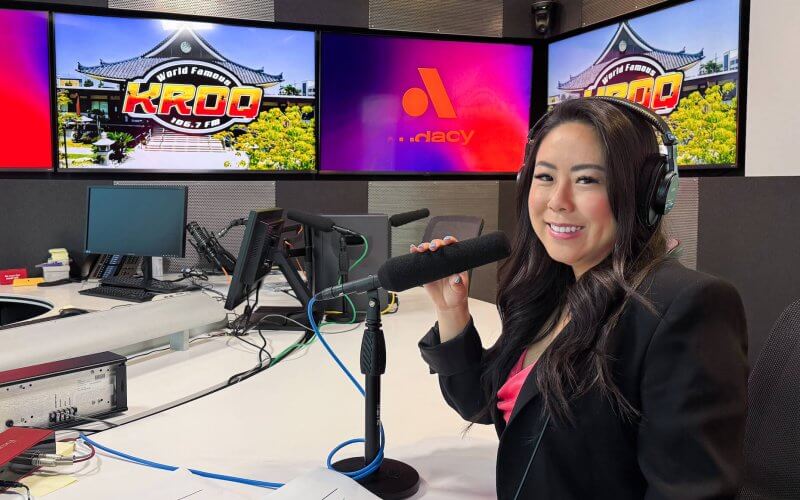
When it comes to love, relationships, communication and all matters of the heart, there’s one certainty — people have questions.
“That’s why there are so many dating shows on Netflix,” said Tara Suwinyattichaiporn, a Cal State Fullerton associate professor of human communication studies. “People spend a lot of time trying to find love, but when they actually find it, they realize that it takes so much work to maintain it. It’s such an important part of people’s lives, and we just don’t know enough about it.”
Inspired to help people find answers to their complex love-related questions, Suwinyattichaiporn has dedicated her academic career to researching such topics as empathetic communication, romance, friendships, jealousy and long-distance relationships. Her work has been published in the Journal of Intercultural Communication Research, Communication Education and Asian Journal of Communication.
Now, she’s taking her expertise to the airwaves as the co-host of KROQ’s reboot of “Loveline,” which airs Sunday nights at 10 p.m. on KROQ in Los Angeles.
Originally launched in the 1980s, the popular radio show encourages listeners to call in and get answers to their dating and relationship queries. As a fan of the show herself, Suwinyattichaiporn said she jumped at the chance to join KROQ evening host Kevan Kenney and provide research-based advice to listeners across Southern California.
“The show gives me the opportunity to use my research as the foundation for helping others. We talk about everything from dating etiquette to gender identity and sexual communication,” said Suwinyattichaiporn.
In response to the California wildfires, Suwinyattichaiporn reflected on tragedy and the serious impact it can have on people’s closest relationships. She advised listeners to focus on communication and healthy coping strategies.
“Start talking about positive emotions first,” said Suwinyattichaiporn. “For a tragedy like this, where many people lost their homes, talking about positive memories first could give people the courage to talk more openly about their anxiety and uncertainty of the future.”

Though this is Suwinyattichaiporn’s first time stepping into a radio studio, she’s no stranger to the media spotlight. Last year, she landed a role as a celebrity dating coach on season 13 of the popular British reality show, “Celebs Go Dating,” where she prepared celebrities to lead successful and healthy relationships.
Suwinyattichaiporn has been interviewed and quoted by such popular publications as Cosmopolitan, Insider and Men’s Health Magazine. She also pens a monthly column in Women’s Health Magazine to address readers’ concerns with dating, self-esteem, intimacy and more.
“I feel really lucky that I’m able to take my research and use it to make a difference in people’s lives,” said Suwinyattichaiporn.“I bring these experiences back to my students, who are curious about how they can expand research beyond academia.”
Collaborating With Student Researchers
After taking Quantitative Research Methods and Sexual Communication courses with Suwinyattichaiporn, CSUF alum Amy Garcia became interested in understanding how family communication impacts people’s understanding of sex as they grow up.
“Family sex communication looks at how families engage with or don’t engage with the topic of sex and how that can affect people’s perspective on sexual identities, development and agency,” said Garcia ’23 (B.A. communication studies).
Collaborating with Suwinyattichaiporn to conduct focus groups, Garcia found that when participants’ families were open and honest about the topic, they grew up with more confidence, self-esteem and a positive understanding of sexual development. However, if families shied away from the topic, it caused the participants to feel fearful, confused and anxious about anything related to sex.
Through her work with Suwinyattichaiporn, Garcia not only bolstered her research portfolio, but she also developed crucial public speaking, writing and presentation skills.
“One of the biggest lessons that I learned from Tara is that it’s so important to love what you’re doing and feel passionate about it. That’s what I felt conducting this research,” said Garcia, who aspires to a career as a professor. “Working with Tara gave me a lot more confidence in what I want to do in the future. The hands-on experience made me feel like ‘I can do this. I have the skills for it.’”